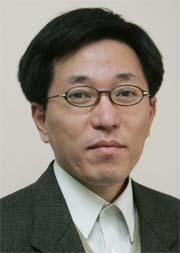Posted on : Feb.9,2007 15:14 KST
Modified on : Feb.10,2007 14:52 KST
By Shin Kisup, Editorial Writer
It was recently revealed that, ahead of the free trade negotiations with the United States in April of last year, the government promised the U.S. that it would allow a system of lawsuits that could quite possibly be unconstitutional. It then scurried about trying to figure what to do about this promise after the fact, according to meeting minutes obtained by The Hankyoreh. It is more than pathetic that the government was so hasty in its decision on something without ever considering how it might conflict with the country’s Constitution; it's just dumbfounding. The meeting it called on the matter - the session from which The Hankyoreh obtained the minutes - was held only after civil society tenaciously took issue with what the government had promised. The government’s office for commerce negotiations said that the meeting was a time arranged for listening to private experts, rather than something hastily arranged to correct a bad situation. [But does the office mean to deny the fact that it was at this very same meeting that someone from the Ministry of Justice called for the new lawsuit system to be pulled from the negotiation table, saying that his ministry "had long said it had inherent problems"?]
What has happened since then is just as preposterous. It was unsurprising that the conservative newspapers, which have been continuously critical of the current administration but at the same time backing big business and pushing for the free trade deal, would stay quiet on this one, but even the general public was way too tolerant with what happened. I’m not calling for unconditional opposition to a free trade agreement with the United States. But the government’s duty is to protect the Constitution; does it not therefore need to be rigid about whether something is constitutional or not? Are we supposed to just let it get away with treating laws we made with our own hands with such indifference? This is an issue that must not be considered an exclusive grievance of those of us who oppose the FTA.
I cannot trust a government that does not place the Constitution above all else, because the Constitution is the final line of defense against the tyranny of power. Prior to making important decisions the government should fully examine whether a decision might violate the Constitution or other laws. There are bad laws, and the Constitution is not perfect, but there is no reason major decisions should not be in line with it.
Maybe it is a cultural remnant of the dictatorship years, but the government is not alone in its disregard for the Constitution. Article 21 says, "Licensing or censorship of speech and the press, and licensing of assembly and association, shall not be accepted," but the National Police Agency superintendent, as if to laugh at this, decided to disallow protests opposing the FTA, and his decision was praised as courageous. The situation is even worse when it comes to labor issues. Article 33 says, "To enhance working conditions, workers have the right to independent association, collective bargaining, and collective action," but you are not going to find any worker in Korea who says that is being respected. Legal strikes are labeled "selfishness that has the economy in a stranglehold" so often you have to roll your eyes. Unlike with most basic rights, those defined in Article 33 begin with "workers" instead of "all citizens," and yet when a court ruled that undocumented migrant workers have the right to form unions, many asked if the idea was to "protect the rights of those who act illegally." Leave it to Korea to be a country where such senselessness passes as common sense.
There doesn’t seem to be much of a difference among the experts, either. When a state bar examiner asks during an oral exam whether "our main enemy is North Korea or the United States," does he know about how the preamble calls for Korea to "contribute to lasting world peace and the common prosperity of mankind," or how Article 5 says, "The Republic of Korea endeavors to maintain international peace and renounces all aggressive wars"? If there is some profound meaning to this that I as a legal layman am unable to comprehend, then we’re not talking about the same Constitution that stipulates that all power comes from the people, since I’m one of them.
Maybe the government and ruling class fear regular citizens understanding the Constitution, because it contains all sorts of annoying rights that would be inconvenient for them to provide. Which is why it is the powerless citizens who need to know the Constitution, more so than the experts. You have to know your rights in order to claim them. Let’s go to the Constitutional Court’s homepage (www.ccourt.go.kr) and read that Constitution. And, at the very least, let’s accurately remember and demand the basic rights that are outlined in Articles 10 through 37. Making the Constitution an even more beautiful one is something there is time to think about later.
Please direct questions or comments to [englishhani@hani.co.kr]

